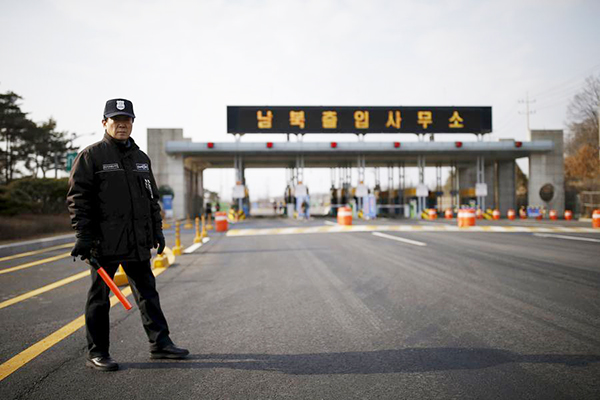Dangerous games on peninsula will have no winner
By Zhang Jingquan (China Daily) Updated: 2016-02-16 08:06
 |
|
A Republic of Korea (ROK) security guard stands guard on an empty road which leads to the Kaesong Industrial Complex (KIC) at the ROK's CIQ (Customs, Immigration and Quarantine) in Paju, South Korea, February 11, 2016. [Photo/Agencies] |
The Korean Peninsula is on the brink of an abyss after the Democratic People's Republic of Korea successfully launched a satellite into orbit. The rocket launch came just one month after the country tested what it claimed to be its first hydrogen bomb.
In response the United States and the Republic of Korea are working closely on the deployment of the US' Terminal High Altitude Area Defense system in the ROK.
Chinese Foreign Minister Wang Yi made clear China's opposition to the possible deployment of THAAD in the ROK when he met with US Secretary of State John Kerry on the sidelines of the Munich Security Conference, saying it would "complicate the regional stability situation".
He also commented on the DPRK's recent nuclear test and rocket launch, saying both moves violated UN resolutions and pose a serious challenge to the global regime on the non-proliferation of nuclear weapons.
It should be noted with regard to the DPRK's nuclear issue, there will be no absolute winner that will walk away with impunity, because it concerns the safety of a considerable number of residents in the region.
Restoring peace and stability on the peninsula requires all relevant parities to engage in constructive dialogue. At present tensions seem to be escalating. After Seoul announced it would stop operations at the industrial zone in the DPRK border city of Kaesong, Pyongyang shut down the industrial complex and declared it a military-controlled area.
Yet, a war is unlikely to break out, unless the DPRK makes concrete progress in the intercontinental ballistic missile research and the miniaturizing of nuclear weapons. That means all parties concerned still have time to tone down their rhetoric and address the Peninsula issues through negotiations.
Fresh international sanctions on the DPRK, of course, are needed to achieve the denuclearization of the Korean Peninsula. In this regard, the following rules have to be kept in mind.

I’ve lived in China for quite a considerable time including my graduate school years, travelled and worked in a few cities and still choose my destination taking into consideration the density of smog or PM2.5 particulate matter in the region.











